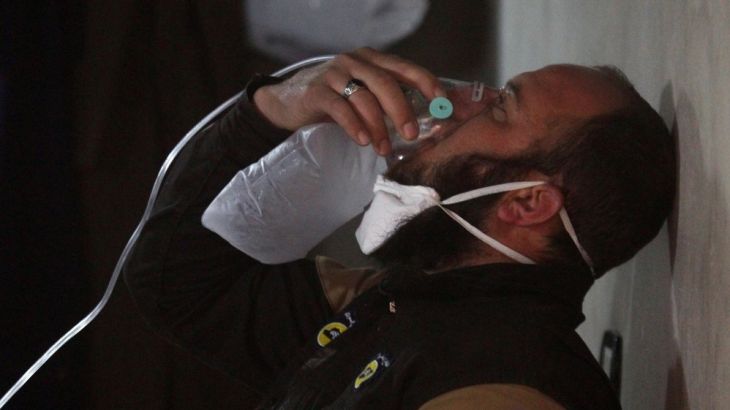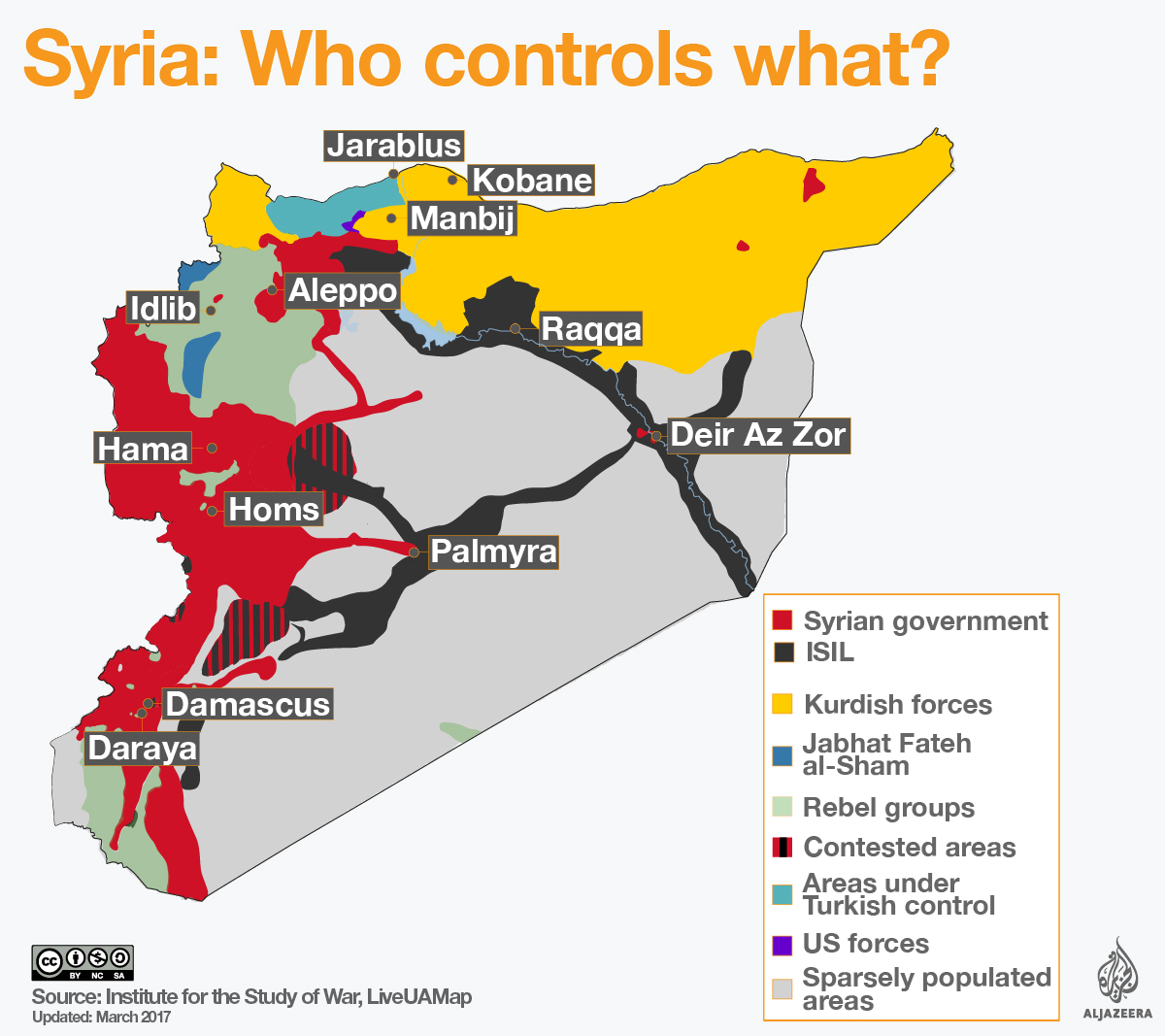‘Toxic gas attack’ in Syria kills at least 58 people
Children among the dead as opposition says Syrian government or Russian jets bombed town with toxic substance.

WARNING: The above report contains images some may find distressing.
At least 58 people, including 11 children, have been killed in a “toxic gas” bombing raid on a rebel-held Syrian town, doctors and a monitor said, in an attack the United Nations quickly said it would investigate as a possible war crime.
Keep reading
list of 4 items‘Mama we’re dying’: Only able to hear her kids in Gaza in their final days
Europe pledges to boost aid to Sudan on unwelcome war anniversary
Birth, death, escape: Three women’s struggle through Sudan’s war
The Syrian Observatory for Human Rights said the attack on Khan Sheikhoun in Idlib province caused many people to choke or faint, and some to foam from the mouth, citing medical sources who described the symptoms as possible signs that gas was used.
The Edlib Media Centre, a pro-opposition group, posted images that were widely shared on social media, showing people being treated by medics and what appeared to be dead bodies, many of them children.
It would mark the deadliest chemical attack in Syria since sarin gas killed hundreds of civilians in Ghouta near the capital in August 2013. Western states said the Syrian government was responsible for the 2013 attack. Damascus blamed rebels.
Locals said the attack began in the early morning, when they heard planes in the sky followed by a series of loud explosions, after which people very quickly began to show symptoms. They said they could not identify the planes. Both Syrian and Russian jets have bombed the area before.
READ MORE: Syria’s civil war explained
Russia’s defence ministry denied it was responsible, telling the state-run RIA news agency that it carried out no bombing runs in the area on Tuesday.
The Syrian government has repeatedly denied using such weapons in the past. On three previous occasions, though, United Nations investigations have found it guilty of using chemical weapons.
The Observatory monitoring group, which tracks the war through a network of contacts on the ground, was unable to confirm the nature of the substance used.
In a statement, the UN Commission of Inquiry on Syria said the use of chemical weapons, as well as any deliberate targeting of medical facilities, “would amount to war crimes and serious violations of human rights law”.
“It is imperative for perpetrators of such attacks to be identified and held accountable,” said the independent panel led by Brazilian expert Paulo Pinheiro.
‘Fainting, vomiting’
The attack came from the air, UN envoy Staffan de Mistura said on Tuesday at an international conference in Brussels aimed at shoring up ailing peace talks.
The European Union’s top diplomat, Federica Mogherini, said: “Obviously there is a primary responsibility from the regime because it has the primary responsibility of protecting its people.”
Opposition activists and the AFP news agency, citing one of its journalists on the scene, said a rocket later slammed into a hospital where the victims were being treated, bringing rubble down on medics as they struggled to deal with victims.
Al Jazeera’s Alan Fisher, reporting from Beirut, said locals on the ground expected that the number of dead would increase and that many of the wounded were children.
“There were people fainting, they were vomiting, they were foaming at the mouth,” Fisher said.
READ MORE: Air raid destroys hospital in Idlib’s Maaret al-Numan
“In that situation, the treatment tends to be to try and strip people off, to get the chemicals away from their bodies, to hose them down as quickly as possible. But even then some of the pictures that have been posted on social media in the last couple of hours show very young people struggling for breath, many people dead where they fell.”
‘Disgusting act’
Fisher reported that hospitals in the area were overwhelmed with the scale of the apparent attack and that footage showed them struggling to cope with the number of victims.
|
|
“Al Jazeera has no way of independently confirming the stories that are coming from there but the reality is there are a number of sources who are saying so many similar things,” Fisher said.
“It appears that what we’re being told is a fair reflection of the current events in Khan Sheikhoun in Idlib province in Syria.”
A member of the White Helmets, a rescue group that operates in rebel-held areas, told Al Jazeera that up to 300 people had been injured.
READ MORE: What next for Turkey in Syria?
Reaction to the attack was swift as it drew outrage from both Syrian and foreign groups, governments and members of the public on social media.
The White House called it “reprehensible” and said it could not be ignored.
“A new and particularly serious chemical attack took place this morning in Idlib province. The first information suggests a large number of victims, including children. I condemn this disgusting act,” France’s foreign minister, Jean-Marc Ayrault, said in a statement.
“In the face of such serious actions that threaten international security, I ask for everyone not to shirk their responsibilities,” he added.
Britain’s foreign minister, Boris Johnson, said if it were proved the government had carried out the raid, President Bashar al-Assad would be guilty of a war crime.
Turkey’s President Recep Tayyip Erdogan told Russian President Vladimir Putin that the “inhuman” attack could endanger peace talks, AFP reported, citing sources.
Hospitals bombed
On Sunday, suspected Russian fighter jets bombed a hospital in another city in Idlib, wounding several people, the White Helmets said.
At least ten people were wounded when three air raids targeted the main hospital in Maaret al-Numan, destroying the building, a White Helmets official told Al Jazeera.
READ MORE: US says Assad’s overthrow no longer a priority
“For the past week, Idlib has been targeted by ongoing air strikes, and after yesterday’s attack, one of its main hospitals has been mostly destroyed and can no longer function,” Majid, another member of the group, also known as the Syrian Civil Defence, said.
Over the past year, Doctors Without Borders has received reports of at least 71 attacks on at least 32 different health facilities which it runs or supports in Syria.
With reporting by Diana Al Rifai.
